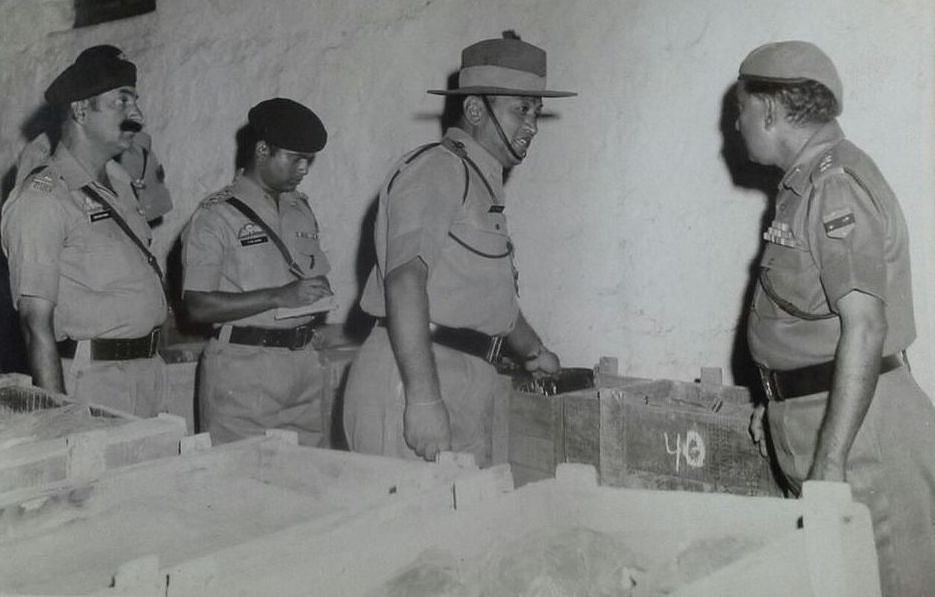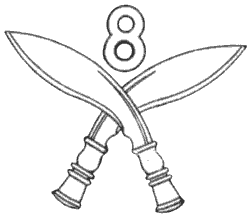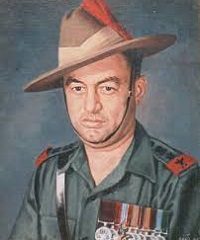“If anyone tells you he is he never afraid of Dying, he is either a liar of a GORKHA”
Field Marshal Sam Manekshaw
The Gorkhas are honored for their indomitable courage and unbreakable spirit. Their traditional weapon (Khukri: a 12 inch long curved blade) and epic war cry “Jai Maa Kali Aayo Gorkhali” (Hail Goddess Kali, The Gorkhas are here) are famous across the Himalayan region and the whole world.
In the early 19th century the British forces fought two wars against the Gorkhas. These wars are together known as the Anglo-Nepalese war which were fought in the years of 1814-1816.
The British then started recruiting the Gorkhas in their army since then. The Gorkhas from that period served in the British Indian army and led them to victory in many battles whether in India or in abroad.
After the independence, the 2nd, 6th, 7th, and 10th regiments of the Gorkhas had been incorporated in the British army. While the 1st, 3rd, 5th, 8th, 9th, and 11 Gorkha regiment are currently serving in the Indian army. Even in Independent India , the Gorkha Regiments of the Indian army have led India in many battles to victory through their exceptional valor and bravery.
However, the Gorkhas’ spirit to protect this country hasn’t got the attention of eminent historians. This article will cover one such story of a Gorkha and his 30 soldiers who defended their post till their last breath at the Indo-China war of 1962.
1962 India-China WAR
While the war of 1962 is remembered only for the defeat that we had suffered from the Chinese, there were several occasions when the soldiers of the Indian army crushed the invading forces.
The story of Major Dhan Singh Thapa is one of such stories.
Content
Major Dhan Singh Thapa
Major Dhan Singh Thapa was born on 10 April 1928 at Shimla, Himachal Pradesh. Later he joined the Indian Army and was commissioned into the 1st Battalion of 8 Gorkha Rifles. The major reason behind the war of 1962 was the expansionist policy of the Chinese and historical boundary disputes. Another reason that triggered the war condition was the safe asylum given by the Indian government to the Dalai Lama of Tibet.
Note: China annexed the modern day region of Tibet in the year of 1950 and they also crushed a mutiny of the Tibetans in the year of 1959.
The Indian government decided to follow the policy as suggested by the then Prime Minister (P.T.Nehru). The policy is known as Forward Policy. The Indian army will occupy the frontier areas along the McMahon line (between Tibet and Arunanchal Pradesh) and in the region of Aksai chin.
Note: The Chinese army was fully prepared for war and had constructed numerous roads
However, the aims of this policy couldn’t be achieved and due to regular skirmishes between the two armies, the war broke out on 20 October 1962.

The soldiers of the Indian army were able to establish some posts in the Ladakh region following the objectives of the Forward Policy. One important region both strategically and technically important from an Indian perspective was the area of Shrijap.
The area of Shrijap was located at the northern part of Pangong Lake.
Note: The protection of this area was very important as it was the link to the most important air base of Indian army at Chushul.
Under the aim of the Forward policy, the troops of the Indian army were able to secure the post of Srijap 1 under the command of Major Dhan Singh Thapa (1st Battalion, 8 Gorkha rifles).

8 Gorkha Rifles
With only 28-30 men under their leader, Dhan Singh Thapa was given the task to guard the post of Srijap. The area was about 48 sq km long. Furthermore, these posts had no connectivity with the base of the Indian army and the only way to supply anything to them was through the lake.
The People’s Liberation Army on 20 October launched a brutal artillery attack on the heavily outnumbered Gorkhalis. This was a type of covering fire attack from the Chinese. While the artillery caused huge damage to the Indians it gave the Chinese enough time to advance 140 m. A total of 600 Chinese were able to advance under the artillery attack.
Due to the heavy shelling, the communication lines of the D Company (Major Dhan Singh Thapa’s company) were completely damaged. The Chinese soldier then charged toward the post of the Indian army. Both injured and helpless but full of courage Indian soldiers went into the war.
The attack from the outnumbered Indians was tremendous and a large number of Chinese soldiers were killed. Thus the attack was repulsed. Major Dhan Singh Thapa bravely motivated his soldiers and even moved from one place to another to keep his troop’s morale at its zenith.
He even said to his troops
“Kafar hunu bhanda marnu ramro” (It is better to die than be a coward).
Furious from this defeat the Chinese again launched the artillery fire and this time they advanced with hand grenades and rocket launchers. Subedar Gurung inflicted heavy losses on the Chinese soldiers. He even went to a different position to strengthen the defenses of their post.
Time to use the Khukris : Heroic Last Stand of Gorkhas
At this time most of the soldiers who were probably be in their 20’s attained martyrdom. Only Major Thapa and a few of his brave soldiers continued fighting. When their ammunition was completely exhausted only 3 soldiers survived in which Major Thapa was one .
This was time to show the skills of the Khukri to the Red army. With the war cry of “Jai Maa Kali Ayoo Gorkhali,” Major Thapa and his soldiers fought with their Khukris till their last breath.
As expected from the invaders, Major Thapa was poorly treated and was taken as a prisoner of war. The Chinese tortured him and even gave punishments. Major Thapa was released from the Chinese captive in November 1962. For his incredible courage, Major Dhan Singh Thapa was awarded the Param Vir Chakra.

He late rejoined the army and retired as a lieutenant Colonel.
To Major Dhan Singh Thapa and all those who died fighting for this country. Jai Hindi.
LIKE WHAT WE ARE DOING? DONATE TO DHARMAYUDH !
If you Support what we are doing and would like to contribute to help us grow and reach more Indians to teach them more about such forgotten historic Indian Heroes and stories, please consider donating any amount. It will help us grow.

